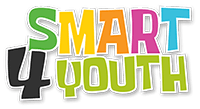PROJECT:
The SMART4YOUTH project is aimed at young people who are the future of the population in the border area. We must therefore be aware that we must invest in people, promote common values, and perhaps the most important thing would be to discover areas and interests for cooperation between countries and between young people.
Through the overall objective of this project “Development and implementation of specific joint programmes in education, aimed at preventing early school leaving among young people at risk, between 14 and 20 years old, over a period of 18 months, programmes consisting of integrative assistance programmes, trainings,experience exchange programmes for teachers and young people, improving the implementation of skills and increasing accessibility in the labour market, extracurricular activities and workshops, actions made possible through the partnership between two educational institutions and two NGOs and solid cross-border cooperation”, the development of innovative extracurricular activities is achieved. The current situation shows us that schools in the border area do not cooperate at all in discovering common solutions to common problems, solutionsâ such as diversification of the educational offer for educational inclusion of all, but also that we are faced with a lack of collaboration with NGOs and opportunities for non-formal education, a collaboration needed to make the school more attractive to young people between the ages of 14 and 20.
According to statistics, on both sides of the border there is an increasing number of drop-outs, school drop-outs or early school leaving situations. Due to a poor educational offer, the younger generation began to migrate to other regions to study. As technical professions are considered outdated and less attractive, more and more companies are experiencing a shortage of qualified staff, but also of human resources in general. We cannot think about sustainable development in the future without considering investing in people in the border area. The applicant has achieved some good results in previous projects considering the implementation of support services and also P1 is showing positive results by introducing the arts and crafts field into the educational offer, making the offers available for 18 months. The partnership can lead to the creation of an innovative model of social inclusion for young people at risk, a model that can be used in the long term on both sides of the border.
The long-term benefits of cross-border cooperation foreseen by the project for project partners are as follows:
– Two multifunctional centres, with all support services developed during the project and which will be included in the educational offer of all four implementing partners, while the space will host all formal and non-formal training activities of teachers and specialists, as well as those for selected young people and those of NGOs;
– The project creates the opportunity for collaboration in the field of educational offers, with the possibility of developing cooperation through learning methods and exchange of experience between teachers and, of course, the relationship with and between students. Quality support services for young people at risk, including information, skills assessment, vocational counselling, family counselling, ICT workshops and apprenticeships in creative workshops can only be effectively developed in close cooperation between schools, with non-formal education providers and involving a multidisciplinary team of teachers from both areas. The exchange of best practices in the field of education and support for young people at risk can only be done through cross-border cooperation.
All four partners are very determined to offer at least one quality programme designed by this project: the applicant through the development of counselling services, P1 by offering
extracurricular activities based on traditional arts and crafts workshops, ACDC by offering trainings to trainers and creativity development workshops based on ICT and entrepreneurial experience, and P3 being specialized in video and photography.
Targeted results
– Creating opportunities for young people to meet across borders with a common interest in learning, build better cultural understanding, intercultural learning and develop the desire for cooperation in ICT programmes, arts and crafts, entrepreneurial facilities and new media technologies that are very attractive today;
– By developing a common online platform, teachers and experts will have the opportunity to cooperate and exchange best practices in the field of educational offers and long-term teaching
methodologies, and also the young people selected for the creative workshops will be able to stay in touch and cooperate after the project is completed.
Project area
The whole project is based on joint cooperation between partners, private-public partnerships, cooperation between public schools and private NGOs, working together for the common need to improve educational offers for young people, to keep them interested and active in schools and to adapt educational offerings to their interests and capacity. This mix of cooperation, including piloting of educational programmes, will be a model of best practice within THE ENI programmes and will be easily transferred to other schools, regions and areas.
Program area after project completion
We believe that by building together this educational offer, we will meet the expectations of new generations, our target group being young people at risk, aged 14-20, related to formal vocational education, and we will have the first experience in developing and evaluating education systems across the border.
